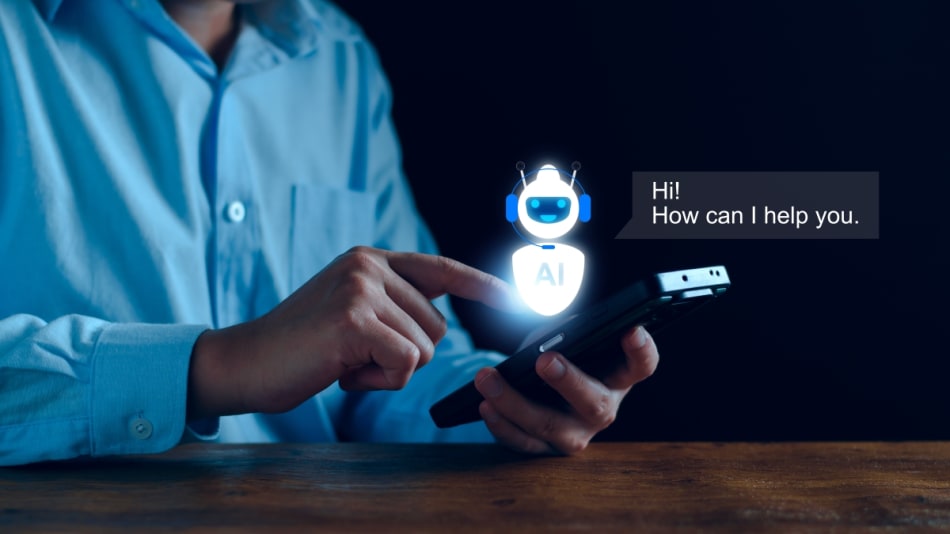
The short story ‘Answer’, published in 1954 by sci-fi writer Fredric Brown, describes the turning on of a ‘super calculator’ that connects all the computers in the known universe. The lead scientist then asks the question ‘Is there a God?’ to which the mega-machine ominously replies ‘Yes, NOW there is a God!’ Panicked, the scientist races to turn it off and is zapped by a lightning bolt.
Since then, the concerns about artificial intelligence have not abated. They have been heightened by the exponential adoption of ChatGPT and subsequently triggered further worries.
Following his resignation from Google, the ‘Godfather of AI’, Geoffrey Hinton, stated that AI could soon be a superior intelligence than humans, before adding a certain amount of regret about his life’s work.

But let’s contextualise what’s really happening. It’s always hard to see how a new technology will impact our lives, mostly because we cannot categorise new tech based on what we already do. David Baddiel once observed ‘the thought that one day I would look at my phone before I went to bed would have struck me as being an incredibly odd thing to do 20 years ago’.
Generative AI tools are being incorporated into the applications we already use. Google, Microsoft and Amazon have entered the generative AI race. Bing Chat and Gemini are enhancing internet browsing. Amazon Web Services are making available AI language models so customers will be able to make their own chatbots. And chances are that you are already interacting with AI.
We should be utilising these new tools to improve the way we do our jobs. They are, after all, tools. Octopus Energy recently employed an AI ChatBot that can do the work of 250 workers. Customers are satisfied with its emails, rating it at 80% compared to the human efforts, which only register 65%. The humans have not been sacked, but redeployed to other jobs.
AI can incorporate opportunities and efficiencies. AI combined with a human, known as a ‘centaur’, can offer extraordinary potential. Not long ago, Hinton was touting the replacement of doctors with AI, insisting we should stop training radiologists because an algorithm would do a better job looking at images. But he missed the point. A doctor using AI can be an infinitely better doctor. A patient with access to ‘trusted’ AI can make better health choices.
Rory Sutherland has spoken about the ‘doorman fallacy’ which criticises reducing roles to mere functions that can easily be automated. A doorman’s role at a hotel is not just to open a door but is to hail taxis, act as security, or advise hotel guests.
We should not be worried about our AI stealing our jobs. We should be getting with the programme and figuring out how AI combined with doctors, nurses and other hard working health professionals can be used for the benefit of them and their patients.

The Double-Edged Sword of AI
There are, however, valid concerns about AI – specifically about reliability and bias. As AI models right now are being built on slightly murky data sources – probably from the internet pre-2021 – there are inherent biases baked in. The real worry will be how we prevent bad data from creating bad outputs. As with any new technology, it’s important to approach Generative AI with caution and to consider its impact on society as a whole.
A recent example would be the way gender bias has permeated social media: Twitter’s censorship of mentions of female body parts can lead to inaccuracies in understanding and availability of information. And this can easily become incorporated into this next wave of technology. Here Geoffrey Hinton is correct in his concerns. Medicine has been notoriously bad at this for years, many treatments were never tested on women and thus issues of efficacy or safety were sometimes never validated.
Ultimately, AI needs regulation. And it needs it now. The FDA was created to protect consumers by making sure new drugs are tested to be safe, including evaluation for long-term impacts and continued assessment. Technology should also be assessed before, during and after being deployed.
We are still in the Wild West and the concerns about the impact of artificial intelligence will come about if we do nothing. In our work today we should be open about how we are using these tools – being clear about what is AI and what is human. A chatbot should be known to be a chatbot. Data collection and processes must be transparent so that it can be scrutinised by a real person with expertise in a chosen field like healthcare.
The most recent victim of the healthcare AI bubble has been the demise of Babylon. It promised so much. Ali Parsa had big ideas and bigger ambitions. He fell into the trap of using AI to replace the doorman. Medicine is not an algorithm to be automated. Parsi was wrong to say his creation was better than a doctor – but a doctor could have been better with Babylon.

We should be applying our own levels of knowledge and experience to the work we create using these tools, while being mindful of bias and reviewing for accuracy and quality. Intelligent digital experiences incorporate AI into them but do not hand over full control.
And we should not be worrying about AI replacing us, we should be worried about not understanding how to implement it properly to reduce risks and bring our teams and colleagues into consideration when we deploy it.
If you’re interested in learning about generative AI and how it impacts your software offering, why not reach out to our team to carry on the discussion? Or why not check out our previous blog around how mobile apps are steering the future of EV adoption?
This article has been written by a human who can be contacted at niaz.rizwani@waracle.com if you want to check or say ‘Hi!’.

Authors
Client Partner
Related

Article • 10 February 2026
Waracle’s 2026 Strategy – Building the Benchmark for Modern Consultancy



